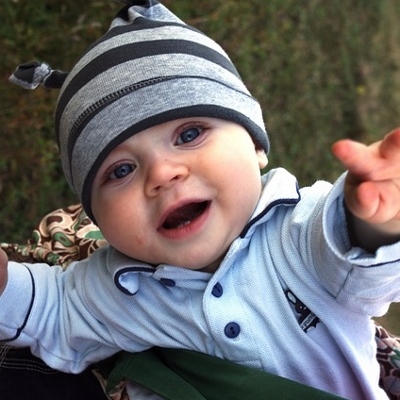 Infants carefully observe their parents to begin learning social skills immediately upon entering this world. Infants take in a ton of information each day just by observing interactions between people in the room. Whenever possible, their attention is zeroed in on their parent’s facial expressions and body language. Infants start to pair up those actions with the words and tone used in the situation. The information picked up during these observations help shape the way your child approaches future socialization activities.
Infants carefully observe their parents to begin learning social skills immediately upon entering this world. Infants take in a ton of information each day just by observing interactions between people in the room. Whenever possible, their attention is zeroed in on their parent’s facial expressions and body language. Infants start to pair up those actions with the words and tone used in the situation. The information picked up during these observations help shape the way your child approaches future socialization activities.
Mimic Time
You can make the most out of those observances by purposefully engaging your infant in expression mimicking activities. As a reflex, infants immediately begin attempting to mimic facial expressions after birth. At around three to six months of age, you should notice your infant purposefully attempting to copy your expressions. At this point, you can start engaging your infant in expression mimicking activities.
For just a few minutes several times a day, sit about a foot away from your baby and begin by giving your infant a big smile. Your infant may attempt to pull up the corners of his or her mouth to copy you. Repeat with all of the expressions you can think of doing, from grimaces and frowns to smiles and pouts. You can stick your tongue out and your baby will too. Make sure to hold eye contact for a few seconds at a time to gauge your infant’s reponses.
Break Period
Although this activity is a lot of fun for everyone involved, including observers, you must appropriately gauge your infant’s interest and tolerance to find a perfect stopping point. In most cases, when your infant starts to look away, end the mimicking session and do something else for a while. You want to keep these sessions short, so your infant is engaged and happy to repeat the expressions. Otherwise, a stress response may inhibit the learning process.
As your infant develops into a toddler, you can add sounds into the routine to help facilitate language development. Work with short vowel sounds first, and then add in consonants as you see fit. Toddlers also enjoy emulating body language, such as shrugs, waves and air kisses, as their coordination improves.
Benefits
The ability to stay in tune with the emotions of others allows for deep connections with friends and family. Although it will be necessary for your child to continue honing social skills, he or she will benefit from these short mimicking sessions throughout life.
Facial mimicking will help your little one learn how to gauge the feelings of others during future socialization activities. You may even notice that your child has the ability to intuitively pick up how you are feeling just by observing your facial expressions.
You will likely realize that empathy comes naturally to your child due to the innate ability to pick up on emotions as they develop. Whether your child ends up a social butterfly or introspective individual, these practice sessions help your child gain the social skills needed for making strong friendships.










